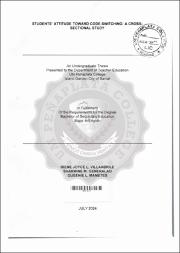Students' attitude toward code-switching: a cross-sectional study

View/
Date
2024-07Author
Villaabrile, Irene Joyce
Generalao, Sharmine
Mametes, Queenie
Bacatan, Jovenil
Citation Tool
Metadata
Show full item recordAbstract
This study aims to determine the students' attitudes toward code-switching. The study employed the non-experimental quantitative research design utilizing descriptive, a cross-sectional method, and stratified random sampling with Mean, t-test, and Analysis of Variance as statistical tools. Researchers used adapted and validated survey questionnaires in gathering the data from the 200 target respondents. The inclusion criteria considered in choosing the respondents is a bona fide Grade 12 student at Nieves Villarica Senior High School in school year 2023-2024. The result showed that the affective indicator of the student's attitude generated a high mean score and showed that the items were frequently evident. It was also found that the students' demographic profiles do not have a significant difference in their attitude toward code-switching. Moreover, the result reveals that students exhibit positive attitudes toward code-switching, as evidenced by high mean scores in affective indicators, suggesting frequent occurrence of code-switching behavior, especially relating to their internal forces like emotions. In addition, the study reveals no significant difference in the result regarding students' attitudes. These results emphasize the importance of integrating code-switching into educational practices, acknowledging its potential benefit in enhancing linguistics flexibility and fostering communication strategies in academic settings. Researchers emphasize performing more research regarding code-switching that is not included in the current study and explore different approaches to deepen understanding of the reasons behind their attitude by providing plausible factors and elaborations.
Collections
Publisher
UM-Peñaplata
